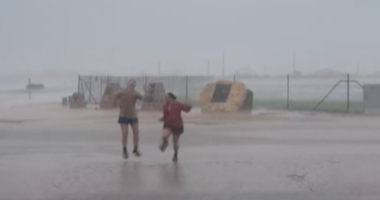Share this @internewscast.com
The rebel Houthi-run al-Masirah channel reported the Sunday morning (afternoon AEST) strikes, the first to hit the rebel-held Sanaa since August 17, when Israel said it targeted energy infrastructure it believed was used by the rebels. Israel has not confirmed Sunday’s attack.
The Iran-backed Houthis have launched missiles and drones toward Israel and targeted ships in the Red Sea for more than 22 months. They say they are carrying out the attacks in solidarity with the Palestinians amid the war in the Gaza Strip.

They are usually intercepted before landing in Israel.
An Israeli Air Force official, speaking on condition of anonymity in line with military regulations, said the projectile fired from Yemen towards Israel on Friday night marked a new threat. The missile was a cluster munition â a projectile that is supposed to detonate into multiple explosives.
It was the first time the Houthis had launched a cluster bomb at Israel since the militant group began launching rockets towards Israel in 2023, the official said. The use of cluster bombs makes it harder for Israel to intercept and also represents additional technology provided to the Houthis by Iran, the official said.
The Houthi attacks over the past two years have upended shipping in the Red Sea, through which about $US1 trillion ($1.56 trillion) of goods passes each year.
From November 2023 to December 2024, the Houthis targeted more than 100 ships with missiles and drones. The rebels stopped their attacks during a brief ceasefire in the war and later became the target of an intense, weekslong airstrike campaign ordered by U.S. President Donald Trump.
In May, the United States announced a deal with the Houthis to end the airstrikes in return for an end to shipping attacks, although the rebel group said the agreement did not include halting attacks on targets it believed were aligned with Israel.












